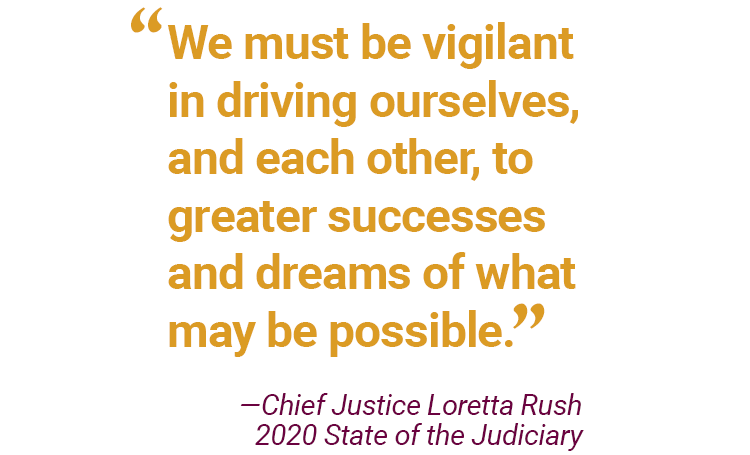Robert Rath, Chief Innovation Officer | Office of Judicial Administration

The Indiana Supreme Court launched a statewide innovation program in November to explore ways to make Indiana’s system of justice more efficient, less expensive, and easier to navigate while continuing to ensure that justice is fairly administered and the rights of all litigants are protected.
The Indiana Innovation Initiative brings together people with a diverse range of skills and experiences to work toward these goals. The Initiative begins with two subgroups to assist in its efforts: the Family Law Task Force and the Technology Working Group. Other subgroups may be added later. Members will make recommendations to the Indiana Supreme Court by July 1, 2021. The Initiative was established to:
- Analyze the research on justice reform
- Assess the impact of reform efforts in other states
- Launch pilot projects to test procedures and determine the scalable value of those procedures
- Identify, map, and analyze commonalities and differences in subject matter and process in criminal, civil, family, and child welfare justice systems
- Identify innovative strategies to manage different case types
- Develop specialized procedures for different types of cases involving differing levels of complexity
- Evaluate the potential and actual impacts of specialized procedures
- Collaborate with and support the Coalition for Court Access in areas where there is overlap in their objectives
Indiana courts have a proven track record of success in areas including evidence-based decision-making, pretrial release, problem-solving courts, commercial courts, and an outstanding statewide technology platform. The Initiative membership includes individuals from all three branches of state government; university professors in business and law; experts in family and child services; attorneys in government and private practice, including public defenders and elected prosecutors; leadership from the Indiana State Bar Association; judges from Indiana’s trial and appellate courts; and, technology leaders from the public and private sectors.
The Supreme Court recently adopted rules mandating the electronic filing of pleadings and documents by attorneys and parties, which allows for more efficient collection and storage by clerks and review by judges on a tablet or computer. Electronic filing enables public access to documents on mycase.in.gov used by courts through the state’s Odyssey case management system.

The Supreme Court instructed the Initiative to consider developments and technologies used in other jurisdictions, such as online dispute resolution, remote video appearance and interpretation, and wizard-driven forms. This review will help us to more timely identify opportunities of significant potential benefit to our customers. And, not all improvements are based on technology. Court rules and procedures, for example, can be adapted to facilitate specific types of cases or scenarios, as with commercial courts.
We may also learn from ideas outside of the judicial system. Innovation is all around us. The iPod reinvented personal access to music. Netflix and YouTube pioneered video on demand. Uber began as a ride-sharing alternative to taxis and has expanded its services to include shipping, food delivery, and transportation by airplane and bicycle. Self-driving cars will reinvent driving, parking, insuring, repairing, owning, and even washing a car. CNN reports that Google’s artificial intelligence system can detect the presence of breast cancer more accurately than doctors. How did those companies bring these ideas to market? Can we learn from their thought process? Increasingly, our customers and staff are at home in the world of Facebook, Netflix, and Google. Online dockets and documents are major leaps forward, but we are just getting started. Optimized justice services in 2030 will look very different from 2020.
The Innovation Initiative will be a sandbox for testing new ideas. Pilot projects can be launched in specific courts to experiment with new technologies, processes, or methods. Pilots may be launched outside of courts, in collaboration with bar associations, legal services or community services organizations, executive branch agencies, the Coalition for Court Access, or other justice services partner entities.
